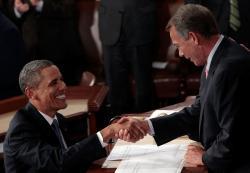President Obama’s hour-long interview with 60 Minutes, recorded Friday and aired Sunday night, suggests his reelection will hinge on an unusual question: What exactly is the president’s job? Obama thinks voters won’t hold him accountable for failing to get Congress to solve the country’s problems. I think he’ll lose that bet.
Obama’s job approval has been negative in nearly every national poll since mid-July. No survey has shown a net positive approval rating. Three polls have shown a tie. Sixty-four have shown a net negative rating. That’s overwhelming evidence that voters don’t think he’s measuring up.
Yet Obama, in his interview with CBS correspondent Steve Kroft, made clear that he thinks he’s doing what’s been asked of him. How does he square his report card with the public’s?
Here’s the key exchange from the interview:
Kroft: You’ve talked a lot about the Republican intransigence. Isn’t it your job as President to find solutions to these problems, to get results, to figure out a way to get it done?
Obama: It is my job to put forward a vision of the country that benefits the vast majority of Americans. It is my job to make sure that my party is behind those initiatives, even if sometimes it’s breaking some china and going against some of the dogmas of our party in the past. We’ve done that on things like education reform. And it’s my job to rally the American people around that vision. And on all three fronts, we’ve been able to do that. If I can’t get Republicans to move—partly because they’ve made a political, strategic decision that says, “Anything Obama’s for, we’re against, because that’s our best chance of winning an election”—I don’t think the American people would see that as a failure on my part.
Obama is right that voters won’t hold him responsible for congressional obstructionism. But he’s ducking the bigger question: What should a president do about congressional obstructionism? There are five obvious options: capitulate, compromise, persuade, bully, or purge. Obama has tried the first three options. But he seems oblivious or allergic to the latter two.
“I’ve already agreed to” budget cuts, Obama told Kroft, “and I’m willing to do more.” What will he do now that Republicans have rejected his proposed fiscal compromises? “That deal remains on the table,” said the president. In the meantime, absent their cooperation, he’s focusing on “every single thing I can do through executive actions. … We’re just gonna keep on looking for specific things that we can do without Congressional cooperation.” When Kroft asked Obama whether he had “stopped reaching out” and had “given up on the Republicans,” the president shrugged, “I’ll worry about the politics sometime next year.”
Next year? The election is less than 11 months away. That’s shorter than the period during which Republicans have controlled the House and gridlocked the Senate. A president’s ability to affect the country through executive action is highly constricted. But a president, more than anyone else, has the power to affect Congress, if not by changing its mind, then by changing its composition.
This is what Obama has failed to do. He’s a good conciliator, compromiser, and persuader. For three years, I told anyone who would listen that he was a great president because of his sound judgment, practicality, balance, and sense of perspective. But there’s no evidence that he’s a fighter. He’s never shown the ability or will to punish his enemies. He inspires no fear. Worse, he’s untroubled by defeat. He seems not to care.
Two months ago, Obama announced that he would address Congress about the jobs crisis. When Republicans objected that the address would conflict with one of their many presidential debates, the president backed down. Last week in Kansas, he finally gave a speech making the case for Democratic values, but he didn’t call for a new Congress or frame the election as a referendum on Republican obstruction. That isn’t who he is.
But that’s what the job is. Obama’s self-checklist—putting forward a vision, rallying the people to that vision, persuading his party to support him—doesn’t cut it. A president’s job is to get things done. If you’re elected president, and Congress won’t compromise and can’t be persuaded, you have to turn up the heat and knock some heads. You have to make your enemies afraid that that if they stand in your way, they’ll lose their jobs. And you have to deliver on that threat. You have to campaign against them. You have to intimidate those who can be intimidated and oust those who can’t.
Obama seems incapable of this. Indeed, he seems unmoved. His serenity is unflappable. Maybe it’s the serenity of a man confident of his reelection despite all evidence to the contrary. Maybe it’s the serenity of a man untroubled by the prospect of losing. Either way, he thinks his role is smaller than the one for which respondents in every poll are holding him accountable. Which is a pretty strong sign that he’s in the wrong job.
William Saletan’s latest short takes on the news, via Twitter:
